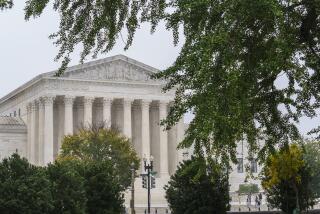Are conservative justices playing devil’s advocate?
“Be careful. They might have been just playing devil’s advocate.”
That was a caution I often heard from my editor at the Pittsburgh Post-Gazette when I wrote that, on the basis of that day’s oral arguments, the Supreme Court justices seemed to be leaning -- or “clearly” were leaning -- toward a certain result.
And it’s true: Sometimes justices ask questions that seem horribly unsympathetic to the side they eventually decide to vote for. It happened last year in the case of Snyder vs. Phelps, which involved vile protests by an anti-gay church near the funeral of a Marine killed in Iraq.
During oral arguments in the case, Justice Ruth Bader Ginsburg posed this question to the lawyer for the church (herself a family member): “This is a case about exploiting a private family’s grief, and the question is: Why should the 1st Amendment tolerate exploiting this bereaved family when you have so many other forums for getting -- getting across your message, the very same day you did?”
Yet Ginsburg voted with seven other justices to hold that the protest was protected by the 1st Amendment.
The Obama administration might want to console itself with that example after Tuesday’s arguments over the constitutionality of the individual mandate in “Obamacare.” Otherwise, reading the paper will be a pain. Nearly every major newspaper led the story with the skeptical questions posed to the solicitor general from Republican-appointed justices, one of whom would have to support the mandate if it were to survive.
Especially tough reading would be this lead from my colleagues David Savage and Noam Levey: “The Supreme Court’s conservative justices sharply attacked the insurance mandate that is at the heart of President Obama’s healthcare law, strongly suggesting Tuesday they are prepared to strike it down as unconstitutional.” Only slightly more reassuring was the Washington Post’s lead: “The Supreme Court’s conservative justices appeared deeply skeptical that the Constitution gives Congress the power to compel Americans to either purchase health insurance or pay a penalty, as the court completed two hours of debate Tuesday on the key component of the nation’s health-care overhaul law.”
The Wall Street Journal story also led with the skeptical questions, but it added that “Justice Kennedy, a perennial swing vote on the court, also asked some skeptical questions of the law’s challengers, leaving the fate of President Barack Obama’s signature legislation in doubt.” The New York Times story had more of a just-the-facts lead: “With the fate of President Obama’s health care law hanging in the balance at the Supreme Court on Tuesday, a lawyer for the administration faced a barrage of skeptical questions from four of the court’s more conservative justices.”
Should a reporter simply say that the justices asked skeptical questions, or try to give the reader his informed impression about what they may portend for the resolution of the case? In this case, lamentably, the second option seems to be the appropriate one. But maybe there’s one devil’s advocate who will rule on the side of the angels.
ALSO:
Reading Supreme Court tea leaves on ‘Obamacare’
Kinsley: On healthcare, time for some judicial restraint
Justices take on healthcare reform law’s 1st issue: What’s a tax?
More to Read
A cure for the common opinion
Get thought-provoking perspectives with our weekly newsletter.
You may occasionally receive promotional content from the Los Angeles Times.






